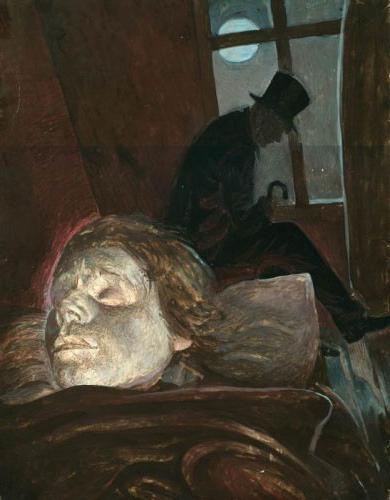
In the January issue of the magazine "New World" in 1926 appeared staggering

The poem opens with an appeal that the poetwill repeat in the dying poem: "My friend, my friend," begins the confessional lyrical hero, "I am very, very sick ...". We understand that it is a matter of mental suffering. A metaphor is expressive: the head is compared with a bird, striving to fly away, "She can not rest her legs on her neck". What's going on? At the time of insanity, a mystical Black man comes to the hero and sits on the bed. Yesenin (an analysis of the sources of the creation of the poem confirms this) appeals to a certain extent to Pushkin's work Mozart and Salieri. The great composer on the eve of his death also saw some sinister black man. However, in Esenin this figure is comprehended in a completely different way. The black man is the poet's Alter-ego, his other "I". What torments the lyrical hero of the nasty Black man?

In the ninth stanza of the poem we see how the lyricthe hero refuses to talk to the intruder, he still wants to disown the terrible story that the Black man leads. Yesenin still does not accept the analysis of the everyday troubles of "some" moral "rogue and thief" as a study of his own life, but resists it. However, he himself understands that it is in vain. The poet reproaches the black guest for daring to invade the depths and get something from the very bottom, for he is "not in the service of ... a diver." This line is polemical to the work of the French poet Alfred Musset, who in the "December Night" uses the image of a diver wandering around the "abyss of oblivion". The grammatical construction ("diving service") appeals to the morphological delights of Mayakovsky, who futuristically bravely broke the established forms in the language.

The image of the night crossroads in the twelfth stanzarecalls the Christian symbolism of the cross, which connects all directions of space and time, and contains the pagan idea of a crossroads as a place of unclean plots and charms. Both of these symbols from childhood absorbed the impressionable peasant youth Sergei Yesenin. The verses "The Black Man" unite two opposing traditions, why the fear and torment of the lyric hero acquire a global metaphysical shade. He "alone at the window" ... The word "window" is etymologically connected in the Russian language with the word "eye". It is the eye of the hut through which light flows into it. The night window looks like a mirror, where everyone sees his reflection. So in the poem there is a hint of who is actually this Black man. Now, the mockery of the night visitor acquires a more concrete shade: it is a poet who appeared "perhaps in Ryazan" (Esenin was born there), about a fair-haired peasant boy "with blue eyes" ...

Unable to contain fury and anger, lyricalThe hero tries to destroy the accursed double, throws a cane at him. This gesture - to throw something in the dreamed out feature - is found more than once in the literary works of Russian and foreign authors. After that the Black man disappears. Yesenin (analysis of the allegorical murder of a double in the world literature proves this) tries to save himself from the persecution of his other "I". But always such a finale is associated with suicide.
A poet standing alone in front of a brokenmirror, appears in the last stanza of the work. The symbolism of the mirror, as a guide to other worlds, leading a person out of reality into a deceptive demonic world, reinforces the gloomy and meaningful finale of the poem.

It is difficult, almost impossible, to scourge yourself like thateyes of a huge audience, as Yesenin does. His incredible sincerity, with which he reveals his pain to the world, makes a confession a reflection of the mental breakdown of all contemporaries of Yesenin. It is no accident that the famous writer Veniamin Levin spoke about the Black man as a judicial investigator "for the affairs of our entire generation", who fed many "most beautiful thoughts and plans." Levin noticed that in this sense the voluntary burden of Yesenin is somewhat akin to the sacrifice of Christ, who "took on himself the weaknesses" and suffered all human "diseases" on himself.
